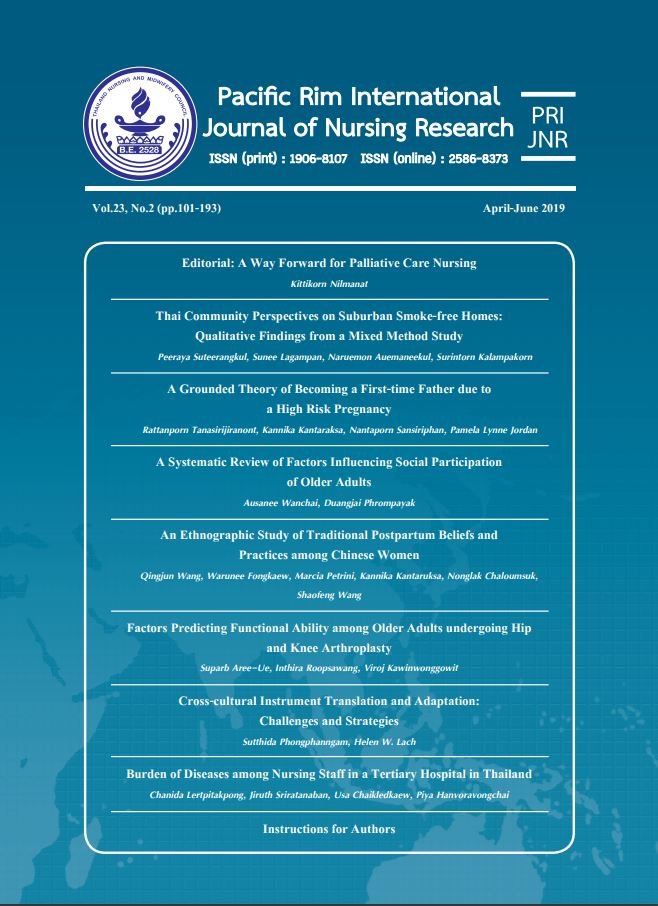A Grounded Theory of Becoming a First-time Father due to a High Risk Pregnancy
Keywords:
Expectant father, Fatherhood, First time father, Grounded theory, High risk pregnancy, Symbolic interactionAbstract
Nursing care during pregnancy usually focuses on the conditions of the mothers rather than fathers, especially during a high risk pregnancy, but first-time fathers confronting such a pregnancy face serious challenges and pressures that effect their lives and relationships. This study explored the process of Thai men becoming a first-time father with a high risk pregnancy to better understand what they faced and how they coped. Twenty-three volunteer informants were recruited from an antenatal clinic in northern Thailand. Interview data were collected and analyzed using grounded theory methodology.
The findings demonstrated that Striving for a Healthy Baby was the core category of the basic social process and consisted of three phases, each with its strategies. 1) Stressing about high risk pregnancy, with the strategies of dealing with emotions, seeking care, and modifying behaviors. 2) Hoping baby and wife will be healthy, with the strategies of dealing with emotions, seeking special care, modifying behaviors, and making a relationship with the baby, and 3) Handling uncertain outcomes, with the strategies of dealing with higher levels of worry, seeking the baby’s safety, preparing for difficult outcomes, and making a relationship with the baby. Throughout the study Buddhist beliefs strongly influenced the actions of the fathers. This study adds new cultural knowledge about the concerns, needs, and strategies of expectant Thai fathers due to a high risk pregnancy that will enable nurses, midwives, and healthcare professionals to assist and care for them.
References
2. Poh HL, Koh SS, Seow HC, He HG. First-time fathers’ experiences and needs during pregnancy and childbirth: A descriptive qualitative study. Midwifery. 2013 30(6): 779-87. doi: 10.1016/j.midw.2013.10.002.
3. American Psychological Association. The changing role of the modern day father. 2016. [cited 2018 April 28]. Available from http://www.apa.org/pi/families/resources/ changing-father.aspx
4. Asenhed L, Kilstam J, Alehagen S, Baggens C. Becoming a father is an emotional roller coaster - an analysis of firsttime fathers’ blogs. Journal of Clinical Nursing. 2013 : 1309-1317. doi.org/10.1111/jocn.12355
5. Betts D, Dahlen H G, Smith C A. A search for hope and understanding: An analysis of threatened miscarriage internet forums. Midwifery. 2014 30: 650-656. doi: 10.1016/j. midw.2013.12.011.
6. Tanasirijiranont, R. Becoming a father: Childbearing perspective. Nursing Journal. 2016 43:139-147.
7. Sriyasak, A., Almqvist, AL, Sridawruang C., Neamsakul, W., & Haggstrom-Nordin, E. The new generation of Thai Fathers: Breadwinners involved in parenting. American Journal of Men’s Health. 2016 :1-11. doi: 10.1177/1557 988316651062
8. Sriyasak A, Almqvist AL, Sridawruang C, Haggstrom-Nordin E. Father role: A comparison between teenage and adult first-time fathers in Thailand. Nursing and Health Sciences. 2015 17:377-386. doi.org/10.1111/nhs.12200
9. Mclaughlin, K. & Muldoon, O. Father Identity, Involvement and Work-family balance: An In-depth interview study. Journal of Community & Applied Social Psychology. 2014 : 439-452. doi:10.1002/casp.2183
10. World Bank. Country and lending group, 2016. [cited 2018 April 28]. Available from http://data.worldbank.org/about/ country-and-lending-group#Upper_middle_income
11. Ministry of Health. Action plan for 2018: Reproductive Health Office. Department of Health. 2018. [cited 2018 April 28]. Available from https://www.anamai.moph. go.th/main.php?filename=Department_2016 [in Thai].
12. Sansiriphan N, Kantaruksa K, Klunklin A, Baosuang C, Jordan P. Thai men becoming a first-time father, Nursing and Health Sciences. 2012 12:403–409.
13. Sirivatanapa P, Tongsong T, Wanapirak C, Piyamongkol W, Sirichotiyakul S, Tongprasert F, Srisupandit K, Luewan S, Traisrisilp K, Sekararithi R, Yampochai A, Taggapichitti A, Leopreecha U. Maternal-Fetal Medicine 2013: Annual report. Chiang Mai: Department of Obstretrics and Gynecology Faculty of Medicine Chiang Mai University; 2016.
14. WHO. Maternal and reproductive health. Global Health Observatory (GHO). 2016 [cited 2018 April 28]. Available from http://www.who.int/gho/maternal_health/en/index.html
15. Rocci SS. Nursing management of pregnancy at risk; pregnancy related complications. In SS Rocci (Ed). Essentials of maternity, newborn, and women’s health nursing, 499-540; Philadelphia, PA: Lippincott Williams & Wilkins; 2016.
16. Ge L, Wikby K, Rask M. Lived experience of women with gestational diabetes mellitus living in China: a qualitative interview study. BMJ Open 2017;7:e017648. doi: 10.1136/bmjopen-2017-017648
17. Hantoosh Zadeh, S., Shariat, M., Farahani, Z., Dehghan, P., Mansory, R., Chegini, N., Amini, F. Assessment of the relationship between recurrent high-risk pregnancy and mothers’ previous experience of having an infant admitted to a neonatal intensive care unit. Journal of Midwifery and Reproductive Health, 2015 3(1): 293-297. doi: 10.22038/jmrh.2015.3585
18. Blumer, H. Symbolic interactionism. Englewood Cliffs: Prentice-Hall; 1969.
19. Glaser, B. G. Basics of grounded theory analysis: Sociology Press; 1992.
20. Glaser, B. G. Doing grounded theory: Issues and discussions. Mill Valley, CA: Sociology Press; 1998.
21. Wuest, J. Grounded theory: The method. In P. Munhall (Ed). Nursing research: A qualitative perspective. Sudbury, MA: Malloy; 2012, pp.225-256.
22. Glaser, B. G. & Strauss, A. L. The discovery of grounded theory: Aldine; 1967.
23. Glaser, B. G. Theoretical sensitivity. Mill Valley, CA: Sociology Press;1978.
24. Alio AP, Mbah AK, Shah K, August EM, Dejoy S, Adegoke K, et al. Paternal Involvement and Fetal Morbidity Outcomes in HIV/AIDS: a population-based study. American Journal Men’s Health. 2013 9 (1): 6-14.
25. Hildingsson I, Johansson M, Fenwick J, Haines H, Rubertsson C. Childbirth fear in expectant fathers: Findings from a regional Swedish cohort study. Midwifery. 2013 30 (2):242-7. doi: 10.1016/j.midw.2013.01.001
26. Nilsen AB, Waldenström U, Rasmussen S, Hjelmstedt A, Schytt E. Characteristics of first-time fathers of advanced age: a Norwegian population-based study. BMC Pregnancy Childbirth. 2013 :13-29. doi: 10.1186/1471-2393-13-29
27. Schytt E, Bergström M. First-time fathers’ expectations and experiences of childbirth in relation to age. Midwifery. 2014 30 (1):82-8.
Downloads
Published
How to Cite
Issue
Section
License
Copyright: The Pacific Rim International Journal of Nursing Research, Thailand Nursing & Midwifery Council has exclusive rights to publish, reproduce and distribute the manuscript and all contents therein.








.png)



